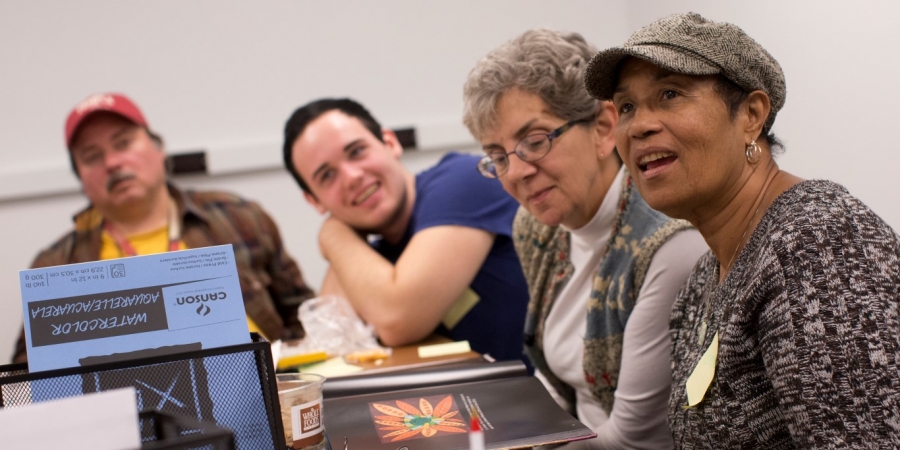Students learn from patients at new aphasia center

As speech-language-hearing major Kim Neubauer, Class of 2016, arranged markers, pastels and pads of paper on a table in Weiss Hall, clients of the newly established PACT (Philadelphia Aphasia Community at Temple) center filed into the room.
They were there for an art class that provides a unique opportunity for self-expression and therapy, as well as interaction with Temple undergraduate students.
“We’ve always provided services to clients with aphasia over the years, but we’ve grown appreciatively to the point where we now have a full-fledged center,” said Associate Professor Rena Krakow, undergraduate program director in the Department of Communication Sciences and Disorders.
A collaboration between the Department of Communication Sciences and Disorders and the Department of Rehabilitation Sciences, both in the College of Public Health, PACT’s center encompasses diagnostic and treatment services as well as research into the condition.
The National Aphasia Association describes aphasia as an “impairment of language affecting the production or comprehension of speech and the ability to read or write.” It is commonly associated with stroke or other neurotraumas, such as car accidents and brain tumors.
“Many clients come to us after hospitalization and a limited period of rehabilitation. At that point they typically have run out of insurance coverage,” said Krakow. “Our center provides the services they need on a sliding scale from no cost to extremely low cost.”
The prevailing medical literature dictates that if aphasia patients don’t get skills back within six months, they’re unlikely to recover later. But the center’s research, led by Communication Sciences and Disorders Professor Nadine Martin, CLA ’87, has proved otherwise.
“When you have patients involved in activities that promote language recovery, they can make continuous improvement for years afterward,” said Krakow.
The art class is one such activity. In this session, which was overseen by faculty members, clients were encouraged to make monthly pages for a calendar. Neubauer showcased her own drawings to spark ideas—fireworks and flags for July; autumn leaves and Thanksgiving turkeys for November— while other undergraduate students took photographs, helped distribute supplies and made conversation with attendees.
Because aphasia can be isolating, creating a social dynamic is extremely important, according to Krakow, as is a sense of accomplishment. “So often people with aphasia are told what they can’t do by their doctors and others,” she said. “Here, they can discover their talents and learn what they can do.”
A former newspaper publisher from Philadelphia's Fishtown neighborhood, Joe Lonergan has found drawing to be a welcome outlet since being diagnosed with aphasia. “I’m glad to be here,” he said, proudly showing his drawings of people and dogs, “and [I’m getting] better and better.”
In addition to participating in the art class, undergraduates regularly interact with clients during informal social hours called CHATs (Coffee Hour Aphasia Time). Through a program called Finding the Words, they’ve also assisted clients in producing their own books. Krakow anticipates that there will be many more opportunities to give students real-world clinical experiences as the center continues to look for ways to connect them with the aphasia population.
David Ferris, Class of 2015, has found the art class valuable as he develops his career plans. “As speech pathology students, we often assume we’ll work with children, but this hands-on experience has made me more interested in working with this population,” he said.
“We can see how people are learning to communicate again, and it’s very satisfying to be part of that.”
-Elisa Ludwig